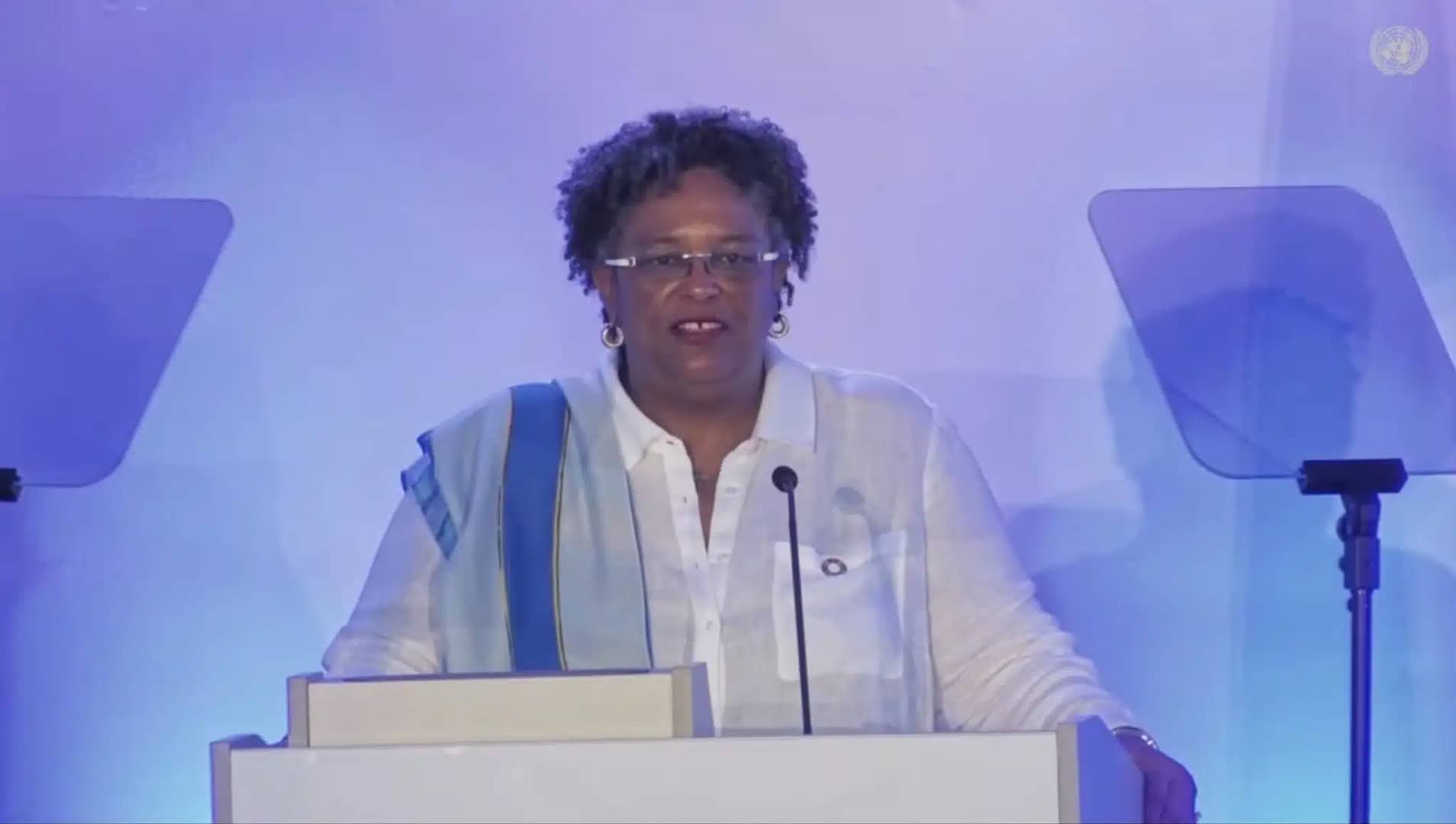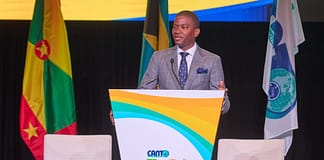
SOURCE: PASSBLUE- An unusually blistering heat wave smothered this Caribbean island nation just as thousands of participants from across the globe — including 22 heads of state and government — attended the fourth United Nations conference on small island developing states, held every decade since 1994.
Hosted by the American University of Antigua from May 27-30, the conference — also called SIDS4 — presented a series of dialogues, panels and buffet of side events to address the unique sustainable development challenges of the world’s 37 small island developing states face from, most notably, the crippling impacts of climate change and the burden of managing unsustainable levels of debt.
“Over the course of the next 18 months, we need to have a new deal” for SIDS, said Prime Minister Mia Mottley of Barbados at the conference. “We have seen some progress, but it is not enough.”
Don’t miss a story, Subscribe to PassBlueSIGN UP NOW
Therese Turner-Jones, who grew up in the Bahamas, lived in Jamaica for 10 years and now resides in Barbados, described the “absolutely crushing” heat wave during the conference as “horrifying,” and exactly what other countries and policymakers from outside the Caribbean needed to experience to fully sense the plight of SIDS. Their economies are disproportionately impacted by severe weather related to climate change and other external shocks.
Turner-Jones is the vice president of operations at the Caribbean Development Bank, based in Barbados. Like most conferencegoers, drenched in layers of sunscreen mixed with sticky sweat, she said that the sultry temperatures will help outsiders better understand how SIDS feel. But whether the experience will translate into meaningful change for the special category of countries remains a looming unknown, fraught with political tensions between the West and the rest.
As SIDS4 wrapped on May 30, UN member states adopted the Antigua and Barbuda Agenda for SIDS (ABAS), a 10-year sustainable development plan for vulnerable island nations. The ABAS is not legally binding but carries moral weight.
This article is part of a series on small states, published by PassBlue. The series focuses on how small countries, which make up most of the UN membership, can optimize the multilateral system individually or as a bloc to enhance their prosperity, security and other governance needs.
“The international community has a duty to support you,” UN Secretary-General António Guterres said in his opening remarks at the conference. The effort should “be led by the countries that have greatest responsibility and capacity to deal with the challenges you face.”
Mottley, a frontline advocate for SIDS who was the conference’s most popular participant, is the driving force behind the groundbreaking Bridgetown Initiative. Named after the capital of Barbados and established in 2022, it seeks to reform the development finance apparatus, like the World Bank and the International Monetary Fund, especially focusing to benefit SIDS.
“We tell people in the name of all of the religions of the world, protect the vulnerable,” Mottley said in her husky voice. “And the one place we don’t practice what we preach is in the international political arena.”

The SIDS community of 37 UN member states is a considerable voting bloc in the UN General Assembly, although not a monolith. It represents three regions: the Atlantic and Indian Oceans and South China Sea; the Caribbean; and the Pacific. SIDS’ total population is approximately 65 million, roughly the same as South Africa, and it is spread across 1,000 distinct islands. They account for less than one percent of the world’s total population, around eight billion.
Yet, SIDS sit on the edge of the expanding global climate crisis even though they contribute only 1 percent of the world’s carbon dioxide emissions. The top three contributors in 2022 were China, at roughly 30 percent; the United States, at 14 percent; and India, 8 percent. SIDS countries are consistently vulnerable to extreme weather events. Dorian, a category-five hurricane that devastated the Bahamas in 2019, for example, caused billions of dollars in damages.
According to the Yale Climate Connections, a project of the university’s School of the Environment, “waters across the Atlantic’s tropical belt — extending from the coast of Africa through the Caribbean — are hotter now than in any other late May on record” this year and will only get hotter through the summer, potentially creating a more “active and destructive” hurricane season.
At a side event at the conference, Jerome Fitzgerald, a senior policy adviser for the Bahamian government, said that given the grim outlook, people there are terrified of what may happen to the island in the months ahead. The 2024 hurricane season officially began on June 1 and ends on Nov. 30.

The worsening climate threats, combined with other vulnerabilities unique to SIDS, such as their remoteness, dependence on food imports, limited population and suffocating debt, create a vicious cycle of oppression that severely limits their development and ability to recover from extreme weather occurrences.
Emily Wilkinson, a research fellow and director of the resilient and sustainable islands initiative at ODI, a global think tank in London, told PassBlue that extreme weather events are not the only threats to SIDS’ financial stability. Other “price shocks” that raise the cost of resources, like the Covid pandemic or the war in Ukraine, can compound the debt burden.
According to the UN’s Office of the High Representative for the Least Developed Countries, Landlocked Developing Countries and Small Island Developing States (UN-OHRLLS), “Over 40% of SIDS are now on the edge of or are already grappling with unsustainable levels of debt.”
Janine Felson, Belize’s deputy permanent representative to the UN, told PassBlue by email that her small island nation of 400,000, classified as a “highly indebted country” by the International Institute for Environment and Development (IIED), “needs help.”

“In 2020, our public debt stood at 126 percent of GDP,” Felson said. “At that point, we were experiencing the worse impact from Covid, our economy was on pause, and we were still paying our debts for our daring attempts to keep our promise to Belizean people. We cannot cope on our own.”
She added, “Unsustainable debt means unsustainable development for SIDS.”
Another widely debated initiative at SIDS4 was the Multidimensional Vulnerability Index (MVI). Considered a milestone in international financial reform, the index captures a country’s needs by providing a more accurate, tailored assessment of its vulnerabilities and overall well-being, rather than using the narrow lens of gross national income (GNI) per person.

“Ireland has been working with SIDS for many years now, in support of their calls for an assessment of prosperity and progress,” Fergal Mythen, Ireland’s ambassador to the UN, said in an email to PassBlue. “The MVI can be an important tool for the UN, the international financial institutions and others to address SIDS needs and build their resilience.”
But while many participants welcomed the MVI, a political fault line has quickly emerged between advocates of reform from the global South, such as Mottley and Gaston Browne, the prime minister of Antigua and Barbuda, and what they call the “post-colonial powers” from the global North, who are resistant to upending the long-entrenched global financial system that benefits the powerful, the advocates say.

Although the MVI has been finalized, it has yet to be officially adopted. Negotiations in the UN General Assembly, led by Portugal and Antigua, continue.
“Obviously, it’s a problem for the SIDS and not the US or other donor countries. They’re kind of logged into a system that appears to work for them,” Godfrey Baldacchino, a professor at the University of Malta, said to PassBlue after the conference. “It also allows them to practice soft diplomacy on their own terms. If I’m giving you [SIDS] money, I’d rather decide and determine the terms. I don’t want you to pull the carpet from under my feet.”
Mottley believes that the core problem for SIDS development is the missing political will among the powerful, which is a recurring problem from the viewpoint of the global South as they push for more equality with the North.
She warned that if the rules of the global financial assistance game don’t change for SIDS, “We will continue to be serfs, for want of a better phrase, with a feudal overlord system [of] the countries that were former colonizers who have continued to be able to direct the world.”
Mottley’s ability to speak plainly and avoiding hollow diplomatic buzzwords make her a sought-after leader in the SIDS space. She’s the kind of person you would want to be sitting in the exit row if the plane you were on was forced to make an emergency landing.

Baldacchino believes that Mottley, “the champion” of SIDS reform, he says, will continue to push for an overhaul of the international finance institutions after the conference has ended. “Watch that space,” he said. “Things are going to happen.”
As for what the SIDS4 accomplished, Baldacchino said it’s the “informal agenda” that will benefit SIDS. “The meetings, the coffee breaks, the snacks, the lobbying, the networking, all that will be a kind of investment that these small states may be able to cash in subsequent to these events,” he said.
“And don’t underestimate the fact that for a week, the attention of some media in the world were focused on Antigua,” Baldacchino added. “This is not something that small states enjoy on a regular basis. It’s a very, very rare thing.”
Beyond SIDS4, Antigua’s Browne, who remains “very hopeful,” insisted that those on the reform frontlines must keep fighting, “especially for developing countries and small island states.”
On the conference sidelines, PassBlue met with Richard Verma, the US deputy secretary of state for management and resources, at the four-star Hodges Bay Resort and Spa in Antigua, where the US delegation was staying (led by Interior Secretary Deb Haaland). Verma said the US tries to address the issues special to SIDS “through our own kind of bilateral and regional approaches.”
“I think it’s about showing up,” he said, “showing up with resources” and working “multilaterally and bilaterally on the policy issues, so that their voices are heard . . . . These are sovereign countries with their own ideas, with their own histories, which are superimportant.”
The US sent 50 interagency representatives to Antigua and contributed $300,000 to the costs of the SIDS4 conference, Verma noted.
Cabo Verde has offered to host the next conference, 10 years from now. Rabab Fatima runs the UN’s Least Developed Countries, Landlocked Developing Countries and Small Island Developing States office and is a special adviser to SIDS4. The Summit of the Future, to be held at the UN in September, she says, is “a critical opportunity for SIDS to elevate their concerns and priorities on the global stage.”
We can “leave no one behind,” she said.
Advertise with the mоѕt vіѕіtеd nеwѕ ѕіtе іn Antigua!
We offer fully customizable and flexible digital marketing packages.
Contact us at [email protected]
















